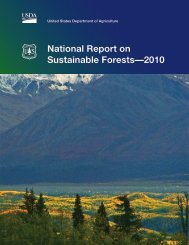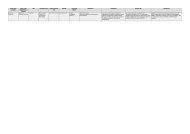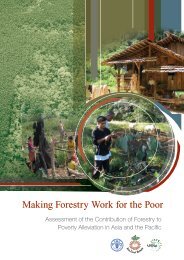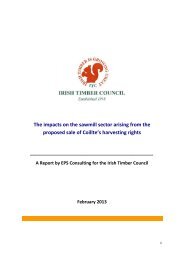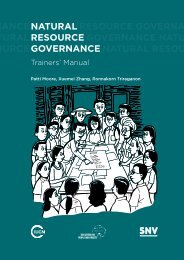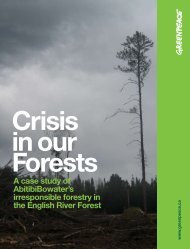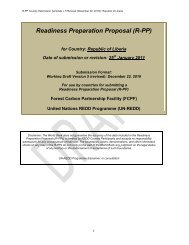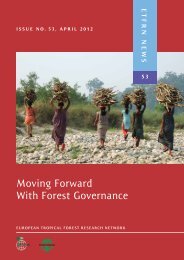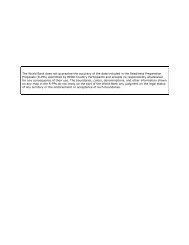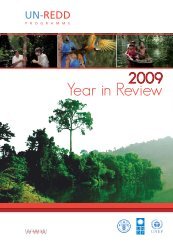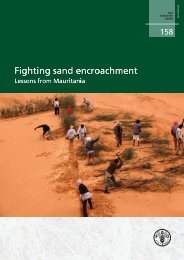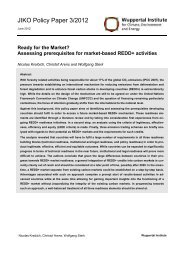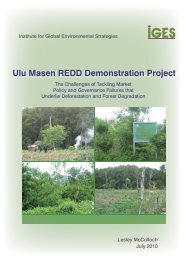Africa - part of its corporate citizenship activities
Africa - part of its corporate citizenship activities
Africa - part of its corporate citizenship activities
You also want an ePaper? Increase the reach of your titles
YUMPU automatically turns print PDFs into web optimized ePapers that Google loves.
Name <strong>of</strong> thecandidateMaurice OumaOdhiamboName <strong>of</strong> theOrganization orNetworkJamaa ReourceInitiativesTitle Address/Country Telephone/Fax/e-mail Website Language(s)SpokenExecutive Salman Centre Tel: +254-773545642 www.EnglishDirector (2nd Floor, Room Email:jamaaresourceinitiatives.org Swahili11) - Kijabe Row info@jamaaresourceinitiatives.orgAddress: P.O. Box1554-20100,NakuruQuestion #1 Question #2 Question #3 Question #4Jamaa is a Swahili word meaning community.Jamaa Resource Initiatives is thus a civilsociety organization advocating for communal<strong>part</strong>icipation and management <strong>of</strong> resourcesfrom resource rich communities.We work to explore the idea <strong>of</strong> self-reliance andcommunity-led and resourced development.Jamaa Resource Initiatives has come intoexistence by understanding the need to reducedependence on foreign aid.The work involves research, focuseddiscussion, and debate on sustainability <strong>of</strong>development efforts by stakeholders throughout<strong>Africa</strong>. Jamaa Resource Initiative’s distinctiveniche is based on one <strong>of</strong> the greatestchallenges that confront the civil society sector.That <strong>of</strong> raising adequate resources to supportdevelopment work.Jamaa Resource Initiative promotes andfacilitates collaborative links within and amongcommunities, individuals, and local businessesto increase efforts in pooling resources togetherfrom various local sources.We DemandThat Multi-national, IFIs, FDIs, private andstate-owned extractive companies todisclose a netfigure for all types <strong>of</strong> payments (royalties,taxes, bonuses etc) made to governments intheir annual financial accounts, and todisclose to which level <strong>of</strong> governmentpayments are made;That The Government <strong>of</strong> Kenya disclosurepayments by all extractive companiesoperating inKenya on a company-by-company basis andby payment type; disclose full revenues fromresource extraction; Independently audit andverify this information in line with bestinternational practice and establish open,<strong>part</strong>icipatory and transparent budgetprocesses at national, regional and locallevels in order to consult with civil society onthe effective allocation and management <strong>of</strong>revenues from resource extraction and publicfinances in order to promote broad-basedeconomic and social development;.That Bilateral and multi-lateral financialinstitutions, including the World Bank Group,IMF, Regional Development banks, exportcredit agencies and private sector banks, torequire extractive companies to comply withthe Publish What You Pay requirements ontransparency <strong>of</strong> payments as a pre-condition<strong>of</strong> all project support, and governments tohave in place a functioning system to ccountfor and independently audit revenues fromextractive industries in return for nonhumanitarian/non-emergencydevelopment,technical and financial assistance;That Extractive companies and localauthorities should disclose information aboutsocial investments and payments to localbudgets made by extractive companies.These payments and investments areimportant factors <strong>of</strong> sustainable social andeconomic development and thus the publicshould be involved in the process <strong>of</strong>managing these revenues;That for the public disclosure <strong>of</strong> extractiveindustry contracts and for licensingprocedures to becarried out transparently in line with bestinternational practice. As contracts typicallyinclude schedules, formulas and otherdeterminants <strong>of</strong> the government’s potentialrevenue streams (such as revenue sharingarrangements, taxes, royalties, bonuses,social benef<strong>its</strong>, etc., and exemptions fromany <strong>of</strong> these) fulfilling the public’s right toaccess these contracts (with exemptions forprovisions that are genuinely commercialconfidential information) will help informcitizens about how much their government issupposed to receive from resourceextraction, which can then be compared withhow much the government actually receives.Contract transparency can thus help civilsociety understand whether governmentshave struck deals with extractive sectorprojects that are in the public interest, andthen whether promised revenues actuallymaterialize.We envisage promoting full accountability <strong>of</strong>IFIs, FDIs, companies and governments inthemanagement <strong>of</strong> resource revenues,Promoting transparency <strong>of</strong> revenues and <strong>of</strong>extractive industry contracts is a vital firststep towards alleviating the crushing poverty<strong>of</strong> ordinary citizens in many resource-richThe Mission statementJamaa Resource Initiative exists to promotesocial responsibility <strong>of</strong> governments,InternationalFinance Institutions, CorporateOrganizations and individuals in East <strong>Africa</strong>through capacitybuilding, advocacy, networking, researchand technical support for a just andequitable society.Main ObjectiveTo promote through research, studies,workshops and seminars the formulationand enforcement<strong>of</strong> environmental policies and laws thatenhances <strong>part</strong>icipatory governance anddemocracy, entrench <strong>corporate</strong> socialresponsibility within the <strong>corporate</strong> sector inKenya and harness community resourcesmore effectively for sustainable developmentSpecific ObjectivesJamaa Resource Initiatives subscribes to thefollowing Specific objectives:1. To raise the competence <strong>of</strong> communityinstitutions and their representatives at alllevels in Kenya on alternative systems andto demand transparency and accountabilityfrom the governments and other publicinstitutions.2. To develop an informational supportservice in order to catalyze change in Kenyaand popularize knowledge on, social capitaland effect cutting edge strategies towardstheir realization.3. To encourage and promote fullaccountability <strong>of</strong> international financeinstitutions, foreign direct investors,companies and governments in themanagement <strong>of</strong> resource revenues, promotetransparency <strong>of</strong> revenues and extractiveindustries contracts4. To engage and use legal systems andprocesses to address conflicts over accessto and control <strong>of</strong> environment and naturalresources by resource dependentcommunities in Kenya5. To establish a permanent structure inKenya which shall devote <strong>its</strong> efforts to thedevelopment and growth <strong>of</strong> alternativesystems and building social capital and to doall such other things as are incidental andconducive to the attainment <strong>of</strong> any <strong>of</strong> theabove objectives.6. To establish facilities such as libraries,databases, data banks and informationnetworks necessary for the gathering,analysis, storage, exchange anddissemination <strong>of</strong> information.7. To enter into any arrangement with anygovernment or inter-governmental agency,provincial or regional authority, corporation,academic or research institution,nongovernmental organization or individualwhere such arrangement may seemconducive to any or all <strong>of</strong> the Organisation’sobjectives and to obtain from them anyrights privileges or concessions which theOrganisation may think desirable.8. To apply to any institution or individual forand accept grants <strong>of</strong> money, aid, donations,gifts and other assistance with a view torealizing the objectives <strong>of</strong> the Institute.No




